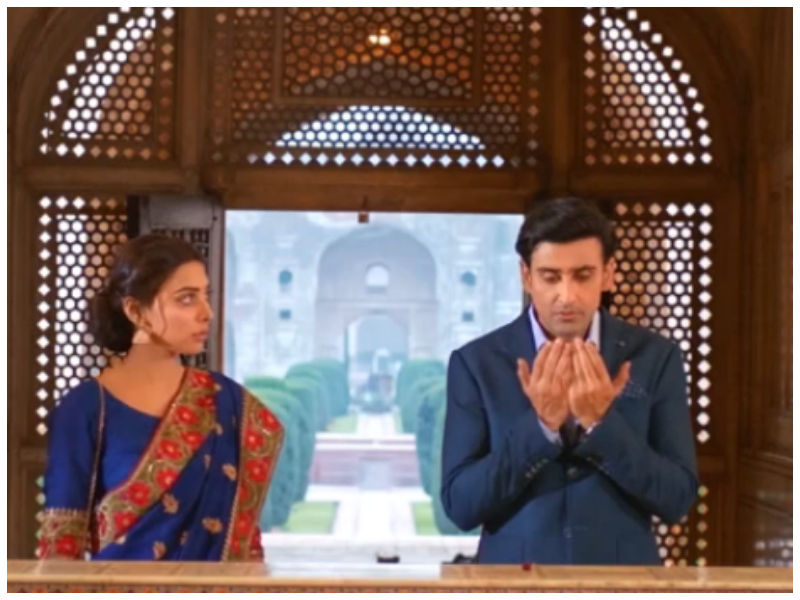Sami Khan, who has been ruling our TV screens with admirable characters like Shayan in Inkaar and Kashif in Ishq Zahe Naseeb forayed on to the silver screen long time back. However, with the revival of Pakistan’s film industry, the actor emerged on the big screen yet again with rom-com Wrong No.2.  The year isn’t over for Sami when it comes to films as the actor will be seen again opposite Eshal Fayyaz in the upcoming film Kaaf Kangana.
During a recent conversation with Something Haute, Sami Khan spoke his heart out about Pakistani film industry. The actor has worked in films in the early 2000 and he is a part of films post-revival as well. So we asked him how much we are actually influenced by Bollywood?
“Until few years ago we were not making good films and we showed only Indian content to our people from films and songs to dramas. We have been living under Bollywood’s shadow for almost four decades, you cannot change it overnight.â€
Sami also expressed that we need to strive and continuously make films in order to mark our territory.
“We need time to establish our own identity as a film industry. We need to make films on the same pattern until people get habitual of visiting cinemas and then we can gradually change. Recent films have proved that we are on the right track,†the actor said.
“In Pakistan, box office success is the only parameter to gauge a film’s worth. Unfortunately, films in Pakistan are either loved by critics or are considered big hit at the box office. We need to find that balance to make films which are critically acclaimed and score big box office numbers as well. Why? Because good reviews improve footfall and good numbers attract more producers,†Sami said.

  Screen grab from Kaaf Kangana’s trailer
Sami also shared his reasons to choose Kaaf Kangana.
“First of all it’s written by Khalil sahib. One doesn’t say no to his TV script, so it’s a big opportunity if you get a chance to work with him for big screen. Also, he is a very passionate person and one gets to learn a lot after working under him,†he said.
“I’m playing a Lahori guy who is very smart and an assistant director in the archeology department. He is brilliant in studies and he met Kangana (Indian girl played by Eshal Fayyaz). He is a typical Pakistani guy jo sahi ha jab tak usay chairho ghay nahi [who will not retaliate unless bothered]. The message of the film is very peaceful,†Sami revealed about his role, Ali Mustafa.
Sami also thinks that the boundaries between film and television roles are non-existent now, especially after OTT platforms like Netflix, Amazon Prime, Hulu etc.
“Hollywood actors are doing Netflix series. Henry Cavill is working in a Netflix series, Matthew McConaughey did True Detective after winning an Oscar and there are many more examples. I agree that even their web-series are at par with their films, but that’s the current trend. Film is a larger-than-life medium and we need to learn how to present an actor as a film actor. More than faces, we need a director’s vision and camera work to alter the image of a hero,†he said giving an example of how he learnt what a ‘superhero shot’ is when he was shooting for Gumm.
“We have a long way to go; films are supposed to be entertainment for masses but it is turned into a luxury here. Even government should also support by giving relief on taxes and permissions to shoot. It’s high time we at least own our industry,†he added.
Read: Haute Review: Sami Khan’s ‘Gumm’ is a lost opportunity
While talking at length about the film industry’s gradual progression, we chanced upon the topic of irrational bans and censorship and Sami had a lot to say.
“We make films for the audience so it is imperative to keep their sensibility in mind. I believe that only 10-20% of our total population is well-versed with social media as well as we know our literacy rates, so I doubt that when we make a film, hardly 10% of this populace may understand it while the rest may take a very misguided message,†he said.
“I believe that there should be a filter or some sort of code to follow. We should know if it is the right time to release a film or not, however, it’s not the end of the world if a film is banned. If your content is strong, you can release it internationally or take it to OTT platforms. Earn praise internationally to prove with your content that it was our bad luck that we banned it,†he concluded.





